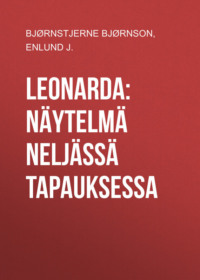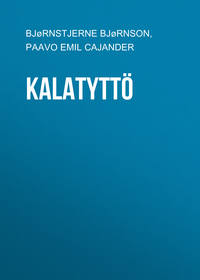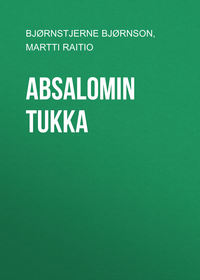 полная версия
полная версияThree Comedies
Mrs. Riis. And you were willing to risk my daughter, whom you are so fond of—for I know you are fond of her—in a lottery? Could one possibly have a clearer proof of the real state of things?
Nordan. Yes, certainly! You yourself, Mrs. Riis—what did you do?
Mrs. Riis. I—?
Christensen. Bravo!
Nordan. You knew what Hoff had said—and more too. (CHRISTENSEN laughs quietly.) Nevertheless you helped your husband, if not actually to try and get her to overlook it, at all events to smooth things over.
Christensen. Bravo!
Nordan. And you called in my help to induce her to take time to think it over.
Christensen. Mothers observe a considerable difference between theory and practice in these matters, I notice.
Nordan. It was only when I saw how deeply it affected Svava—what a horror she had of it—that my eyes were opened. And the longer I listened to her, the more sympathy I felt for her; for I was young myself once—and loved. But that was such a long time ago—and I have grown tired—
Mrs. Riis (who has sat down at the little table). My God!
Nordan. Yes, Mrs. Riis. Let me tell you candidly—it is the mothers, and no one else, that by degrees have made me callous. Mothers look upon the whole thing so callously. The fact is that as a rule they know what is what.
Christensen. That they do, the dear creatures! And Mrs. Riis is no exception to the rule. You must admit, my dear madam, that you did all you could to hold on to a young man who had had a lively past? Not to mention the fact that this same young man had an extremely good social position—a thing I only allude to incidentally.
Nordan. Exactly. Rather than not give their daughters a prospect of what they call "a good marriage" they straightway forget all that they have suffered themselves.
Mrs. Riis. You see, we do not know that it will turn out the same in their case.
Nordan. You don't know it?
Mrs. Riis. No, I tell you that I did not think so! We believe that the man our daughter is going to marry is so much better. We believe that in their case there are stronger guarantees—that the circumstances are altogether different. It is so! It is a kind of illusion that takes hold of us.
Christensen. When there is a prospect of a good marriage, yes! I entirely agree with you, Mrs. Riis—for the first time. Moreover, I think there is another side to it. Isn't it possible that women have not suffered so much after all from the fact that men are men? What? I fancy the suffering has been more acute than serious—something like sea-sickness; when it is over—well, it is over. And so when it is the daughters' turn to go on board, the dear mothers think: "Oh, they will be able to get over it too! Only let us get them off!" For they are so anxious to get them off, that is the truth!
Mrs. Riis (getting up and coming forward). Well, if it is so, surely it is nothing to make fun of! It only shows what a woman can sink to, from living with a man.
Christensen Indeed!
Mrs. Riis. Yes—because each generation of women is endowed with a stronger and stronger aspiration for a pure life. It results unconsciously from the maternal instinct, and is intended as a protection for the defenceless. Even worthless mothers feel that. But if they succumb in spite of it, and each generation of married women in its turn sinks as deep as you say, the reason of it can only be the privilege that men enjoy as part of their education.
Christensen. What privilege?
Mrs. Riis. That of living as they please when they are bachelors, and then having their word of honour believed in when they choose to enter the married state. As long as women are powerless to put an end to that horrible privilege or to make themselves independent of it, so long will one half of the world continue to be sacrificed on account of the other half—on account of the other half's lack of self-control. That one privilege turns out to be more powerful than all the striving for liberty in the world. And that is not a laughing matter.
Christensen. You are picturing to yourself a different world from this, and different natures from ours, Mrs. Riis. And that—if you will excuse my saying so—is obviously all the answer that is necessary to what you say.
Mrs. Riis. Well, then, give that answer openly! Why do you not openly acknowledge that as your standpoint?
Christensen. But don't we?
Mrs. Riis. No—not here, at all events. On the contrary, you range yourselves ostensibly under our banner, while all the time you are secretly betraying it. Why have you not the courage to unfurl your own? Let these bachelor customs of yours be sanctioned as entirely suitable—then we should be able to join issue with you. And then every innocent bride would be able to know what it is she is entering upon—and in what capacity.
Nordan. That would be simply nothing more or less than abolishing marriage.
Mrs. Riis. Would not that be more honest, too? Because now it is only being corrupted, long before it begins.
Christensen. Oh, of course it is all the men's fault! It is the fashion to say that now—it is part of the "struggle for freedom." Down with man's authority, of course!
Mrs. Riis. The authority his bachelor life has won for him!
Nordan. Ha, ha!
Mrs. Riis. Do not let us cover up the real issue with phrases! Let us rather speak of the "desolate hearth" that the poet writes of. Marriage laid in ruins is what he means by that; and what is the cause of it? What is the cause of the chilly, horrible commonplace of every-day life—sensual, idle, brutish? I could paint it even more vividly, but I will not. I will refrain, for instance, from bringing up the subject of hereditary disease. Let the question be thrashed out openly! Then perhaps a fire will be kindled—and our consciences stirred! It must become the most momentous question in every home. That is what is needed!
Christensen. Our conversation has soared to such heights that it really seems quite an anti-climax for me to say that I must go to a "higher place"!—but you must excuse me all the same.
Mrs. Riis. I hope I have not delayed you?
Christensen. No, there is plenty of time. I am only longing fervently—you really must not be offended—to get away from here.
Mrs. Riis. To your—equals?
Christensen. What a remarkable thing that you should remind me of them! And, by the way, that reminds me that I am scarcely likely to meet you or your family in future.
Mrs. Riis. No. Our acquaintance with you is at an end.
Christensen. Thank God for that!—All I hope now is that I shall succeed in apportioning the ridicule with some degree of justice.
Mrs. Riis. You need only publish your autobiography!
Christensen. No—I think it should rather be your family principles, madam! They are really very quaint. And when I relate the manner in which they are put into practice by yourselves, I rather think that people will be quite sufficiently amused. To speak seriously for a moment—I mean to attack your husband's reputation in private and in public, until he quits the town. I am not the sort of man to accept a humiliation like this without returning the compliment. (Turns to go.)
Nordan. This is shocking!
Alfred (appearing in the doorway of the house). Father!
Christensen. You here?—How ill you look, my boy! Where have you been?
Alfred. I came here at the same time as you did, and have heard everything. Let me tell you this at once, that if you take another step against the Riis's, I shall go round and tell every one the reason why Miss Riis threw me over. I shall tell them exactly what it was. Oh, it is no use looking at me with that mocking expression! I shall do it—and at once, too.
Christensen. I think you may spare yourself the trouble. The gossip about a broken engagement will get all over the town quicker than you could spread it.
Nordan (going up to ALFRED). One word, my boy—do you still love her?
Alfred. Do you ask that because she has been unjust to me? Well, now I know quite well what led to it—and inevitably led to it. I understand now!
Christensen. And forgive her? Without anything more?
Alfred. I love her more than ever—whatever she thinks of me!
Christensen. Well, upon my word! What next, I should like to know? You claim your right to resume the rôle of lover, and leave us and other honest folk to put the best face we can on the muddle you have made! I suppose you are going across the road now to tell her how much you enjoyed yourself yesterday?—or to ask for a respite till to-morrow, to give you time to pass decently through a process of purification? May I ask where you are going to find it and what it is going to consist of? Oh, don't look so melodramatic! If you can put up with what you got from Riis's girl yesterday and her mother to-day, surely you can put up with a little angry talk or a little chaff from your father. I have had to put up with the whole affair—the betrothal and the breaking it off as well! And then to be sprinkled with essence of morality into the bargain! Good Lord! I hope at least I shall not smell of it still when I get to the palace. (Goes towards the house, but turns back at the door.) You will find same money in the office to pay for a trip abroad. (Exit.)
Nordan. Does that mean banishment?
Alfred. Of course it does. (Appears very much agitated.)
Mrs. Riis. Doctor, you must come over to our house with me—and at once!
Nordan. How is she?
Mrs. Riis. I don't know.
Nordan. You don't know?
Mrs. Riis. She wanted to be alone yesterday. And to-day she went out early.
Nordan. Has anything happened, then?
Mrs. Riis. Yes. You told me yesterday that you had given her a hint about—her father.
Nordan. Well?
Mrs. Riis. And so I felt that it could not be concealed any longer.
Nordan. And you have—?
Mrs. Riis. I have written to her.
Nordan. Written?
Mrs. Riis. It seemed the easiest way—and we should escape talking about it. All yesterday afternoon and last night I was writing, and tearing it up, and writing again—writing—writing! It was not a long letter, when all was done, but it took it out of me.
Nordan. And has she had the letter?
Mrs. Riis. When she had had her breakfast this morning and gone out, I sent it after her. And now, my dear friend, I want to beg you to go and have a talk with her—then you can let me know when I may go to her. Because I am frightened! (Hides her face in her hands.)
Nordan. The moment you came I saw something serious had happened. You argued so vehemently, too. Well, matters have developed, and no mistake!
Mrs. Riis. You mustn't go away, doctor! Don't go away from her now!
Nordan. Oh, that is it, is it?—Thomas!
[Enter THOMAS.]
Thomas. Yes, sir.
Nordan. You need not pack my things.
Thomas. Not pack, sir?—Very good, sir. (Gives the doctor his stick and goes to open the house door for them.)
Nordan. Allow me, Mrs. Riis. (Offers her his arm.)
Alfred (coming forward). Mrs. Riis! May I speak to her?
Mrs. Riis. Speak to her? No, that is impossible.
Nordan. You heard, my boy, what she has to think about to-day.
Mrs. Riis. And if she would not speak to you before, it is not likely she will now.
Alfred. If she should ask to speak to me, will you tell her I am here? I shall stay here till she does.
Mrs. Riis. But what is the use of that?
Alfred. Well, that will be our affair. I know she wants to speak to me, just as much as I do to her. Only tell her I am here! That is all I ask. (Goes away into the farther part of the garden.)
Nordan. He does not know what he is talking about.
Mrs. Riis. Dear Dr. Nordan, let us go! I am so frightened.
Nordan. Not more than I am, I think.—So she knows it now, does she! (They go out.)SCENE II
(SCENE.—The same as in Acts I. and II. SVAVA comes into the room slowly and looks round; then goes to the door and looks round outside the house, then comes in again. As she turns back, she sees NORDAN standing in the doorway.)
Svava. You!—Oh, Uncle Nordan! (Sobs.)
Nordan. My child! My dear child! Calm yourself!
Svava. But haven't you seen mother? She said she had gone across to see you.
Nordan. Yes, she is coming directly. But look here—suppose you and I go for a good long walk together, instead of talking to your mother or anyone? Along quiet walk? Eh?
Svava. I can't.
Nordan. Why?
Svava. Because I must make an end of all this.
Nordan. What do you mean?
Svava (without answering his question). Uncle—?
Nordan. Yes?
Svava. Does Alfred know this?—Did he know it before?
Nordan. Yes.
Svava. Of course every one knew it except me. Oh, how I wish I could hide myself away from every one! I will, too. I see the real state of things now for the first time. I have been like a child trying to push a mountain away with its two hands—and they have all been standing round, laughing at me, of course. But let me speak to Alfred!
Nordan. To Alfred?
Svava. I behaved so wrongly yesterday. I ought never to have gone into the room—but you gave me no choice when you came to me. I went with you almost unconsciously.
Nordan. I suppose it was thinking of your father—of what I told you about him—that made you—
Svava. I did not understand all at once. But, when I was by myself, it all flashed across me—mother's strange uneasiness—father's threats about leaving the country—all sorts of expressions, and signs—lots and lots of things I had never understood and never even thought twice about! I chased them out of my mind, but back they came!—back and back again! It seemed to paralyse me. And when you took me by the arm and said: "Now you must go in!"—I hardly had strength to think. Everything seemed to be going round and round.
Nordan. Yes, I made a regular mess of it—both on that occasion and the time before.
Svava. No, it was all quite right—quite right! We certainly went a little off the lines, it is true. I must speak to Alfred; the matter must not rest as it is. But, except for that, it was all quite right. And now I have got to make an end of it all.
Nordan. What do you mean?
Svava. Where is mother?
Nordan. My dear girl, you ought not to try and do anything to-day. I should advise you not to speak to anybody. If you do—well, I don't know what may happen.
Svava. But I know.—Oh, it is no use talking to me like that! You think I am simply a bundle of nerves to-day. And it is quite true—I am. But if you try to thwart me it will only make me worse.
Nordan. I am not trying to thwart you at all. I only—
Svava. Yes, yes, I know.—Where is mother, then? And you must bring Alfred here. I cannot go to him, can I? Or do you think he has too much pride to come, after what happened yesterday? Oh, no, he is not like that! Tell him he must not be proud with one who is so humiliated. (Bursts into tears.)
Nordan. But do you think you are able for it?
Svava. You don't know how much I can stand! Anyway, I must get done with it all, quickly. It has lasted long enough.
Nordan. Then shall I ask your mother—?
Svava. Yes!—and will you ask Alfred?
Nordan. Presently, yes. And if you should—
Svava. No, there is no "if" about it!
Nordan.—if you should want me, I won't go away till you are "done with it all," as you say. (SVAVA goes up to him and embraces him. He goes out. After a short pause MRS. RIIS comes in.)
Mrs. Riis (going to SVAVA). My child! (Stops.)
Svava. No, mother, I cannot come near you. Besides, I am trembling all over. And you don't understand what it is? It has not dawned upon you that you cannot treat me like this?
Mrs. Riis. Treat you like this, Svava? What do you mean?
Svava. Good heavens, mother!—letting me live here day after day, year after year, without letting me know what I was living with? Allowing me to preach the strictest principles, from a house like ours? What will people say of us, now that everything will be known!
Mrs. Riis. Surely you would not have wished me to tell my child that—
Svava. Not while I was a child. But when I had grown up, yes—under any circumstances! I ought to have been allowed the choice whether I would live at home under such conditions or not! I ought to have been allowed to know what every one else knew—or what they may get to know at any moment.
Mrs. Riis. I have never looked at it in that light.
Svava. Never looked at it in that light? Mother!
Mrs. Riis. Never!—To shield you and have peace in our home while you were a child, and peace afterwards in your studies, your interests and your pleasures—for you are not like other girls, you know, Svava—to ensure this, I have been almost incredibly careful that no hint of this should come to your ears. I believed that to be my duty. You have no conception what I have stooped to—for your sake, my child.
Svava. But you had no right to do it, mother!
Mrs. Riis. No right?—
Svava. No! To degrade yourself for my sake was to degrade me too.
Mrs. Riis (with emotion). Oh, my God—!
Svava. I do not reproach you for anything, mother! I would not do that for the world—my dear mother! I am only so infinitely distressed and appalled at the thought of your having to go about carrying such a secret with you! Never able to be your real self with me for a moment! Always hiding something! And to have to listen to my praises of what so little deserved praise—to see me putting my faith in him, caressing him—oh, mother, mother!
Mrs. Riis. Yes, dear, I felt that myself—many and many a time. But I felt that I dared not tell you. It was wrong—so very wrong! I understand that now! But would you have had me leave him at once, as soon as I knew of it myself?
Svava. I cannot take upon myself to say. You decided that for yourself. Each one must decide that for herself—according to the measure of her love and her strength. But when the thing went on after I was grown up—! Naturally that was why I made a second mistake. I had been brought up to make mistakes, you see. (RIIS is heard outside the window, humming a tune.)
Mrs. Riis. Good heavens, there he is! (RIIS is seen passing the left-hand window. When he reaches the door, however, he stops and, with the words, "Oh, by the bye!" turns back and goes hurriedly out.)
Mrs. Riis. You look quite changed, my child! Svava, you frighten me! Surely you are not going to—?
Svava. What is it that is in your mind, mother?
Mrs. Riis. The thought that, as I have endured so much for your sake, you might make up your mind to endure a little for mine.
Svava. A little of this? No, not for a moment!
Mrs. Riis. But what are you going to do?
Svava. Go away from here at once, of course.
Mrs. Riis (with a cry). Then I shall go with you!
Svava. You? Away from father?
Mrs. Riis. It has been for your sake that I have stayed with him. I won't stay here a day without you!—Ah, you don't want me with you!
Svava. Mother, dear—I must have time to accustom myself to the changed state of things. You have quite changed in my eyes too, you see. I have been mistaken in you, and I must get accustomed to that idea. I must be alone!—Oh, don't look so unhappy, dear!
Mrs. Riis. And this is the end of it all—this is the end of it!
Svava. I cannot act otherwise, dear. I must go away now to my Kindergartens and give up my life entirely to that work. I must, I must! If I cannot be alone there, I must go farther afield.
Mrs. Riis. This is the cruellest part of it all—the cruellest part! Listen, is that—? Yes, it is he. Do not say anything now! For my sake say nothing now; I cannot bear anything more on the top of this!—Try to be friendly to him! Svava—do you hear me! (RIIS comes back, still humming a tune; this time he has his overcoat over his arm. SVAVA comes hurriedly forward, and after a moment's hesitation sits down with her back half turned to him, and tries to busy herself with something. RIIS puts down his overcoat. He is in court dress and wears the Order of St. Olaf.)
Riis. Good morning, ladies! Good morning!
Mrs. Riis. Good morning!
Riis. Here is the latest great piece of news for you: Who do you think drove me from the palace? Christensen!
Mrs. Riis. Really?
Riis. Yes! Our wrathful friend of yesterday! Yes! He and one of my fellow-directors. I was one of the first persons he greeted when he got to the palace. He introduced me to people, chatted with me—paid me the most marked attention!
Mrs. Riis. You don't mean it?
Riis. Consequently nothing really happened here yesterday! No gloves were thrown about at all, least of all in his eldest son's face! Christensen, the worthy knight of to-day's making, feels the necessity for peace! We ended by drinking a bottle of champagne at my brother's.
Mrs. Riis. How amusing!
Riis. Therefore, ladies—smiles, if you please! Nothing has happened here, absolutely nothing! We begin again with an absolutely clean slate, without a smear upon it!
Mrs. Riis. What a piece of luck!
Riis. Yes, isn't it! That rather violent outburst of our daughter's has unburdened her mind and cleared the ideas in other people's heads. The general atmosphere is agreeably clear, not to say favourable.
Mrs. Riis. And what was it like at the palace?
Riis. Well, I can tell you this—when I looked round at our batch of new-fledged knights, it did not exactly impress me that it is virtue that is rewarded in this world of ours. However, we were all confronted with an alarmingly solemn document. It was about something we swore to preserve—I fancy it was the State—or perhaps the Church—I am really not sure, because I didn't read it. They all signed it!
Mrs. Riis. You, as well?
Riis. I, as well. Do you suppose I was going to be left out of such good company? Up at those exalted heights one obtains a happier and freer outlook upon life. We were all friends up there. People came up and congratulated me—and after a bit I wasn't sure whether it was on my daughter's account or on my own; and, what is more, I never knew I had so many friends in the town, let alone at Court! But in such brilliant company and such an atmosphere of praises and compliments and general amiability, one was not inclined to be particular! And there were only men present! You know—you ladies must excuse me—there is sometimes a peculiar charm in being only with men, especially on great occasions like that. Conversation becomes more pointed, more actual, more robust—and laughter more full of zest. Men seem to understand one another almost without the need of words.
Mrs. Riis. I suppose you are feeling very happy to-day, then?
Riis. I should think I am!—and I only wish every one were the same! I daresay life might be better than it is; but, as I saw it under those circumstances from those exalted heights, it might also be much worse. And, as for us men—oh, well, we have our faults, no doubt, but we are very good company for all that. It would be a dull world without us, I am sure. Let us take life as it comes, my dear Svava! (Comes nearer to her. She gets up.) What is the matter? Are you still in a bad temper?—when you have had the pleasure of boxing his ears with your own gloves, before the whole family circle? What more can you reasonably ask of life? I should say you ought to have a good laugh over it!—Or is there something up? What? Come, what is the matter now?
Mrs. Riis. The fact is—
Riis. Well, the fact is—?
Mrs. Riis. The fact is that Alfred will be here in a moment.
Riis. Alfred here? In a moment? Hurrah! I quite understand! But why didn't you tell me so at once?
Mrs. Riis. You have talked the whole time since you came in.
Riis. I do believe I have!—Well, if you are going to take it seriously, my dear Svava, perhaps you will allow your "knightly" father to take it lightly? The whole thing amuses me so tremendously. I was put into good spirits to-day the moment I saw, from Christensen's face, that there was nothing in the wind. And so Alfred is coming here directly! Then I understand everything. Hurrah, once more! I assure you that is the best of all the good things that have happened to-day. I really think I must play a festal overture till he comes! (Goes towards the piano, singing.)
Mrs. Riis. No, no, dear! Do you hear? No, no! (RIIS plays on, without listening to hey, till she goes up to him, and stops him, pointing to SVAVA.)
Svava. Oh, let him play, mother—let him play! It is the innocent gaiety that I have admired since I was a child! (Bursts into tears, but collects herself.) How hateful! How horrible!









